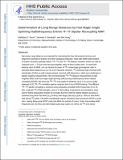Determination of long-range distances by fast magic-angle-spinning radiofrequency-driven 19 F-19 F dipolar recoupling NMR
Author(s)
Roos, Matthias; Mandala, Venkata Shiva; Hong, Mei
DownloadAccepted version (1.565Mb)
Terms of use
Metadata
Show full item recordAbstract
Nanometer-range distances are important for restraining the three-dimensional structure and oligomeric assembly of proteins and other biological molecules. Solid-state NMR determination of protein structures typically utilizes 13C-13C and 13C-15N distance restraints, which can only be measured up to ∼7 Å because of the low gyromagnetic ratios of these nuclear spins. To extend the distance reach of NMR, one can harvest the power of 19F, whose large gyromagnetic ratio in principle allows distances up to 2 nm to be measured. However, 19F possesses large chemical shift anisotropies (CSAs) as well as large isotropic chemical shift dispersions, which pose challenges to dipolar coupling measurements. Here, we demonstrate 19F-19F distance measurements at high magnetic fields under fast magic-angle spinning (MAS) using radiofrequency-driven dipolar recoupling (RFDR). We show that 19F-19F cross-peaks for distances up to 1 nm can be readily observed in two-dimensional 19F-19F correlation spectra using less than 5 ms of RFDR mixing. This efficient 19F-19F dipolar recoupling is achieved using practically accessible MAS frequencies of 15-55 kHz, moderate 19F radio frequency field strengths, and no 1H decoupling. Experiments and simulations show that the fastest polarization transfer for aromatic fluorines with the highest distance accuracy is achieved using either fast MAS (e.g., 60 kHz) with large pulse duty cycles (>50%) or slow MAS with strong 19F pulses. Fast MAS considerably reduces relaxation losses during the RFDR π-pulse train, making finite-pulse RFDR under fast-MAS the method of choice. Under intermediate MAS frequencies (25-40 kHz) and intermediate pulse duty cycles (15-30%), the 19F CSA tensor orientation has a quantifiable effect on the polarization transfer rate; thus, the RFDR buildup curves encode both distance and orientation information. At fast MAS, the impact of CSA orientation is minimized, allowing pure distance restraints to be extracted. We further investigate how relayed transfer and dipolar truncation in multifluorine environments affect polarization transfer. This fast-MAS 19F RFDR approach is complementary to 19F spin diffusion for distance measurements and will be the method of choice under high-field fast-MAS conditions that are increasingly important for protein structure determination by solid-state NMR.
Date issued
2018-10Department
Massachusetts Institute of Technology. Department of ChemistryJournal
Journal Physical Chemistry B
Publisher
American Chemical Society (ACS)
Citation
Roos, Matthias K., Venkata S. Mandala, and Mei Hong. "Determination of long-range distances by fast magic-angle-spinning radiofrequency-driven 19 F-19 F dipolar recoupling NMR." Journal Physical Chemistry B 122, 40 (Oct. 2018): p. 9302-13 doi 10.1021/ACS.JPCB.8B06878 ©2018 Author(s)
Version: Author's final manuscript
ISSN
1520-6106
1990-7923